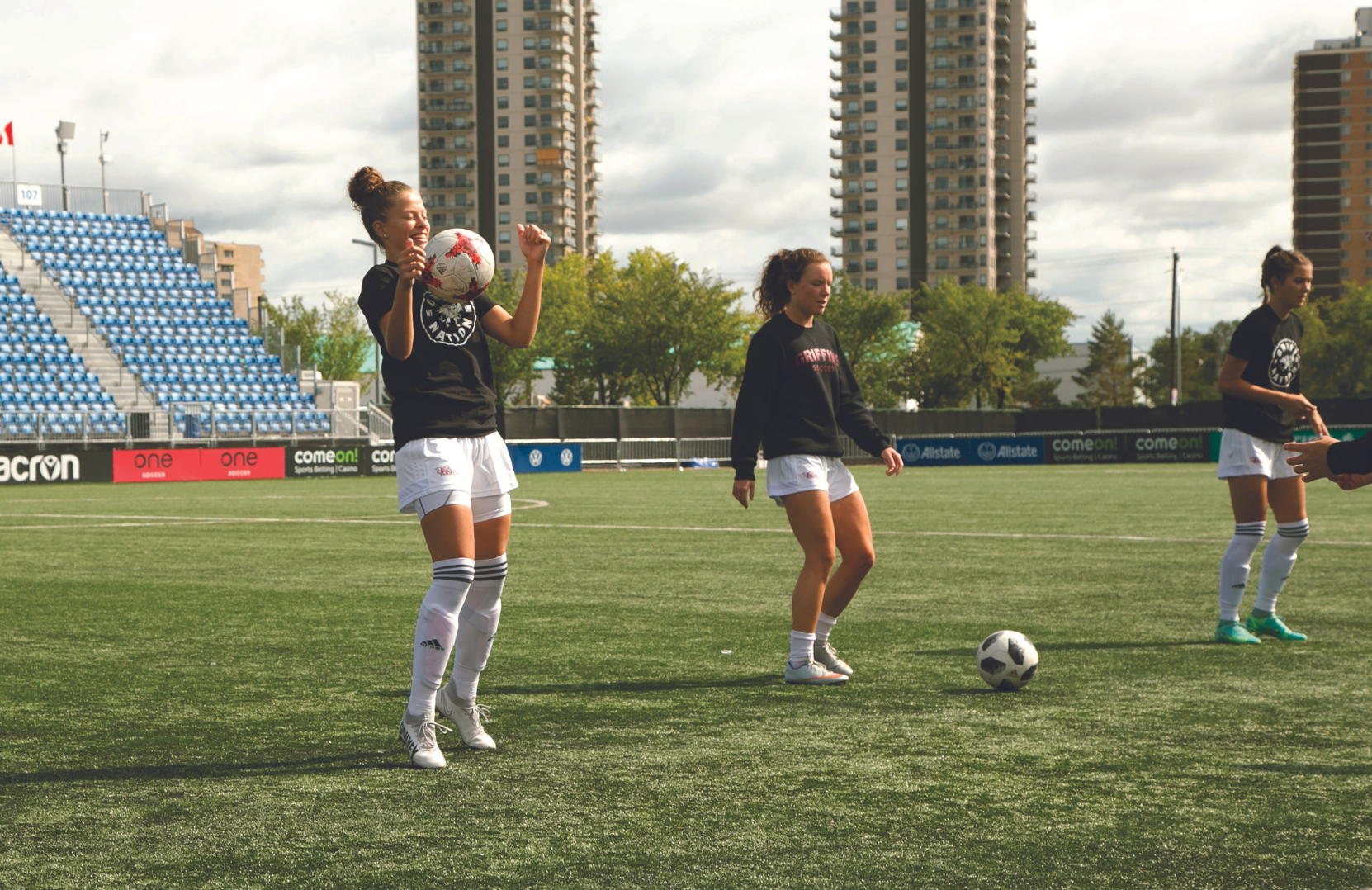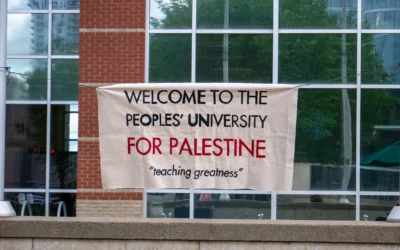After the 2020 Tokyo Olympics this summer, female athletes have been propelled, and deservedly so, into the spotlight. Female athletes made up more than half of the athletes on Canada’s Olympic team, and women took home two-thirds of Canada’s total medals.
While the attention and coverage of female sports during the Olympics was a step in the right direction, there is still a long way to go before women’s sports are viewed equally to men’s in terms of pay, television coverage, and respect.
Samantha Gouveia, a centre back on the women’s soccer team at MacEwan University, and Kaylin Hermanutz, a midfielder, have been playing soccer nearly their whole lives — since they were four years old — and they plan on pursuing a career in the game after university.
The tricky part is finding those opportunities for female soccer players. While there are opportunities like the National Women’s Soccer League (NWSL), United Women’s Soccer (UWS), and the Women’s Premier Soccer League (WPSL), these operate primarily out of the United States. Other pro leagues are overseas, like in Switzerland, but there aren’t as many opportunities in Canada alone.
“I think it’s important that Canada starts investing in young footballers, especially in the female game,” says Gouveia. “We have the talent here, that’s no doubt about that, it’s just about providing opportunities here in the city and the nation and … (keeping the talent) at home.”
“If we have the program to grow the talent at home, I think it’ll be really good for us,” adds Hermanutz. “Not having that opportunity here at home, it kind of restricts a lot of girls (from reaching) their true potential because it’s a lot to move across the (world). If it was at home, it would be game changing.”
Hermanutz says that women are not taken as seriously as men are in sport. She notes that Canadian women are dominating the soccer scene, especially the women’s national team in the Olympics, and yet there isn’t a female equivalent to a program like FC Edmonton here in the city.
“At the end of the day what we’re trying to do for (female athletes), as they deserve it, is try to open up more doors,” says Dean Cordeiro, the head coach of the women’s soccer team at MacEwan. “We’re trying to get to a point where our female footballers are being recognized and having the same opportunities as (their) male counterparts.”
Cordeiro notes that athletes and their teams are finding ways to carve a path for female athletes. For example, Emily Burns, a former MacEwan goalkeeper, just signed with AS Saint-Étienne, a professional soccer club in France this year. But having a Canadian league here would open so many doors.
“From a gender equity side, the males are far ahead. They started before (women), they have more support, more investors, and we’re trying to close that gap. Hopefully at one point, we’ll be at a stage where we’re looking at (men’s and women’s soccer) as the same, even when it comes to salaries and things like that,” says Cordeiro. “Then you’re in a situation where these females can make a career out of playing the game that they (have loved) since they were four years old.”
Basketball sees even more limited opportunities for female athletes. “It’s really unfortunate because … outside of our national team program which is obviously reserved for the elite of the elite … university sports is the highest level (of basketball for women that) we have. And your career is over when you’re 22, 23, or 24,” says Katherine Adams, the head coach of the women’s basketball team at MacEwan. “It’s really, I think, a flaw in the system that there isn’t the opportunity … for these very high-level athletes to continue playing post university.”
Adams has been coaching the women’s basketball team at MacEwan for six seasons, and has seen interest in women’s basketball — and basketball in general — grow, but there is still a long way to go. “I think personally, just exposure to (women’s basketball) and celebrating the success of women (will improve opportunities),” says Adams. “I certainly think the Olympics games this past summer highlighted the capacity of women to excel at an elite level and kind of opened some eyes to, ‘Oh wait a minute — women can do great things and let’s put some more attention on it and highlight them and showcase what they can do.’”
“It’s a very small starting point,” Adams continues, “but it is a starting point, and hopefully that might expand some opportunities and (create) more exposure so that people will come out and watch (women’s games).”
Becca Curtis and Hayley Lalor are guards on the women’s basketball team, and they are in their second and third years on the team, respectively. Both women have experienced obstacles as female athletes throughout their athletic career.
“When I was in high school, I wasn’t allowed to go to our basketball academy program because the teacher and coach wanted it to be strictly his men’s team,” says Curtis. “So, I wrote a few letters and complaints to get into that, but there was a year and a half where I wasn’t allowed to be in it.”
“There’s general obstacles of people not respecting (women’s basketball) as much and especially guys being like, ‘Oh, well it’s just girls’ basketball,’” says Lalor.
Adams notes that men’s and women’s basketball is the same sport, but the game is played very differently. “I think that there is a misconception that women’s basketball isn’t as good or as exciting because women don’t have, physiologically, the same ability to play the game vertically. We can’t jump to dunk yet … and it takes away — they think — some of the entertainment factor,” she says. But that simply isn’t the case. “The thing is, young women put in the same amount of work, the same amount of time, and they are incredibly, incredibly talented. And you have to understand that they have an appreciation for really the great work that they’re doing and the beauty of the game that they play.”
One major issue for female athletics is fan base; there just aren’t as many fans for women’s basketball as there are for the NBA. At MacEwan, Curtis says that the promotion of the men’s and women’s teams is fairly even, “but the turnout (at games) is very different. I don’t think we have as many fans coming to our games as the men do.”
Another issue in female athletics is coaching. Most of the coaches at high levels of athletics are men. “I think that there’s always that feeling of having to prove yourself … as a female coach,” explains Adams. “I have to be better than my male counterparts because I’m female …. There are very competent men
coaching women’s sports teams for sure, and there are men I know who are excellent at what they do and prefer coaching women … but it almost feels like a fallback where if you can’t get a job coaching men, then you can just coach women until an opportunity to coach men comes up. And then that takes away opportunities from women who want to coach at higher levels.”
Natalie Bender and Kyrelle Skoye are fifth- and sixth-year athletes on the women’s hockey team at MacEwan. Bender is a goalie and Skoye plays defense.
“(The) first time I ever had a female head coach was coming to MacEwan with Lindsay (McAlpine),” says Bender, “and it was an all-female coaching staff, which was unheard of for me growing up.”
Both women plan on continuing with hockey after university, either through coaching or playing in a women’s league. “I’d love to give back and coach,” says Bender, “cause I know the female coaches I’ve had growing up have had a big impact on me, so it’d be nice to return the favour.”
Bender and Skoye say that they were very fortunate because they grew up playing hockey on girls’ and womens’ teams, but they know many female athletes who didn’t have those opportunities. This year is the first time that one of the players on their team has ever played on a women’s team.
But even though they grew up in an environment that championed women’s hockey, there are still limitations. Bender notes that although the minor hockey league is relatively equal for girls and boys, that equality doesn’t translate once athletes age out. Men have the NHL, the AHL, pro leagues in the United States and Europe and more. Female athletes don’t have half as many opportunities, and attempts to level the playing field for women in hockey haven’t always been successful, either. The Canadian Women’s Hockey League was shut down in 2019.
Volleyball on the other hand, seems to be very inclusive for women. “I think volleyball is a huge women’s sport,” says Madison Hoppus, a left side defensive specialist on the women’s volleyball team at MacEwan. “Lots of (women’s) teams end up having two or three (alternate) teams to get as many girls playing (as possible), whereas the guys’ team, they usually only have one.”
There aren’t many opportunities to play professionally within Canada, says Megan Foxcroft, a libero on the women’s volleyball team, but there are other options: “the next step above varsity athletics within Canada is playing for the national team, but I think anyone that plays at the varsity level has the opportunity to go play pro in Europe or anywhere around the world. There’s so many different contracts and teams internationally that you can go play for,” she says.
Foxcroft has never felt held back because she is a female athlete. “Just because (volleyball) is more of a (female) oriented sport, especially at the younger levels, I’ve never felt like I’ve been at a disadvantage,” says Foxcroft. “But I do have friends who have played hockey, maybe basketball, sports that are more directed towards men originally …. I know it is harder for them, especially hockey: all the big clubs are with the men’s teams not the women’s. But I’m fortunate enough that with volleyball, there’s so many opportunities to play as a woman.”
“As a society,” Foxcroft adds, “we’re so focused on all these outstanding male athletes that play in the NHL or the NBA. But as we saw at the Olympics this past (summer), the majority of the medals we won came from women. It (shouldn’t) need to take an international podium to recognize that.”
There isn’t an excuse to ignore women’s sports any longer. Female athletes have shown time and time again that they have the talent, drive, and love of the game that is equal to men, and they deserve equal opportunities as well.
Come out and support our talented female athletes at MacEwan this year. Bring your cheers, your support, and a few friends.





0 Comments